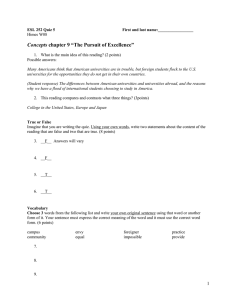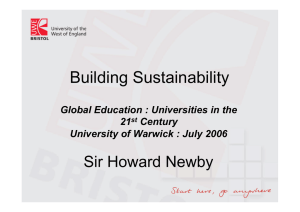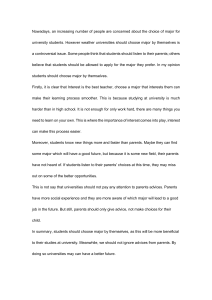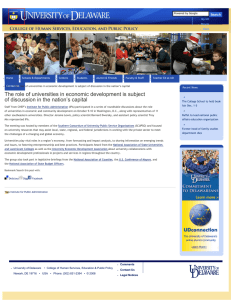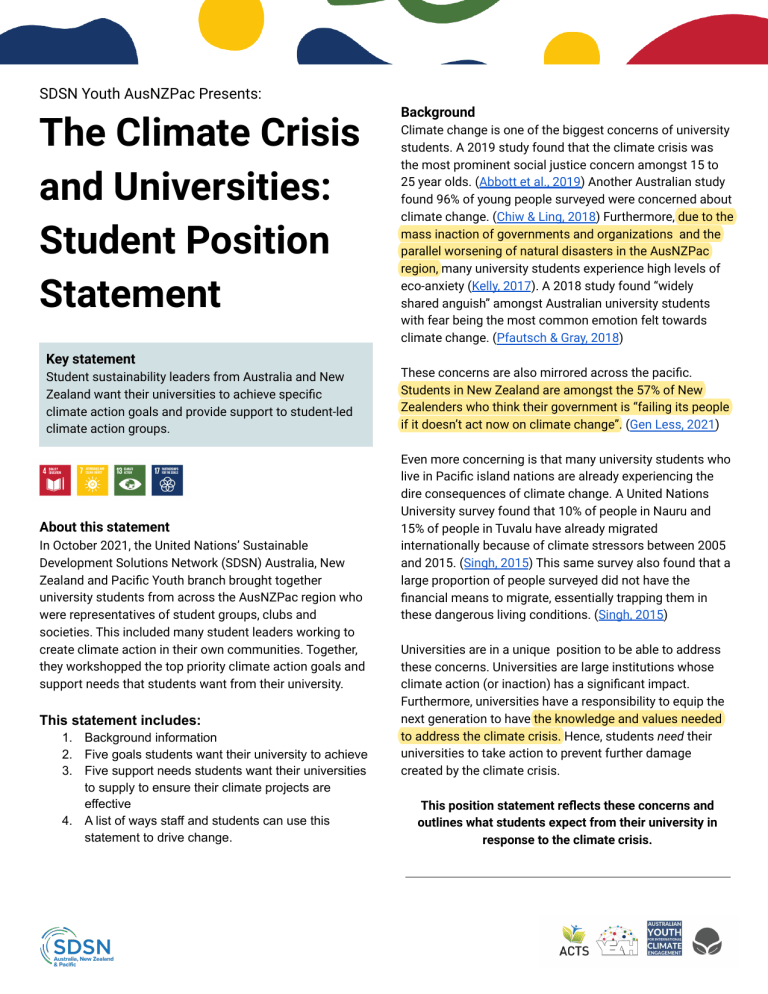
SDSN Youth AusNZPac Presents: The Climate Crisis and Universities: Student Position Statement Key statement Student sustainability leaders from Australia and New Zealand want their universities to achieve specific climate action goals and provide support to student-led climate action groups. About this statement In October 2021, the United Nations’ Sustainable Development Solutions Network (SDSN) Australia, New Zealand and Pacific Youth branch brought together university students from across the AusNZPac region who were representatives of student groups, clubs and societies. This included many student leaders working to create climate action in their own communities. Together, they workshopped the top priority climate action goals and support needs that students want from their university. This statement includes: 1. Background information 2. Five goals students want their university to achieve 3. Five support needs students want their universities to supply to ensure their climate projects are effective 4. A list of ways staff and students can use this statement to drive change. Background Climate change is one of the biggest concerns of university students. A 2019 study found that the climate crisis was the most prominent social justice concern amongst 15 to 25 year olds. (Abbott et al., 2019) Another Australian study found 96% of young people surveyed were concerned about climate change. (Chiw & Ling, 2018) Furthermore, due to the mass inaction of governments and organizations and the parallel worsening of natural disasters in the AusNZPac region, many university students experience high levels of eco-anxiety (Kelly, 2017). A 2018 study found “widely shared anguish” amongst Australian university students with fear being the most common emotion felt towards climate change. (Pfautsch & Gray, 2018) These concerns are also mirrored across the pacific. Students in New Zealand are amongst the 57% of New Zealenders who think their government is “failing its people if it doesn’t act now on climate change”. (Gen Less, 2021) Even more concerning is that many university students who live in Pacific island nations are already experiencing the dire consequences of climate change. A United Nations University survey found that 10% of people in Nauru and 15% of people in Tuvalu have already migrated internationally because of climate stressors between 2005 and 2015. (Singh, 2015) This same survey also found that a large proportion of people surveyed did not have the financial means to migrate, essentially trapping them in these dangerous living conditions. (Singh, 2015) Universities are in a unique position to be able to address these concerns. Universities are large institutions whose climate action (or inaction) has a significant impact. Furthermore, universities have a responsibility to equip the next generation to have the knowledge and values needed to address the climate crisis. Hence, students need their universities to take action to prevent further damage created by the climate crisis. This position statement reflects these concerns and outlines what students expect from their university in response to the climate crisis. March, 2022 1 Goals students want their universities to achieve These are climate action goals that the students workshopped and want their university to prioritise and include in their own charters and position statements. Overview of the goals 1.1. Commit to building climate literacy in all of the university's students and staff 1.2. Clarity and transparency about the university’s relationships with third-parties 1.3. Inclusion of indigenous voices in climate action decision making 1.4. Carbon neutrality 1.5. Minimising single-use plastic in campus catering facilities 1.1. Commit to building climate literacy in all of the university's students and staff. The students see that educating their community is the most important and meaningful way that universities can create climate action. Universities should be prepapering the next generation of leaders to be climate conscious. Universities need to include climate knowledge into all courses and provide accessible ways that staff and students can learn about climate change and what ways the university is promoting climate action. 1.2. Clarity and transparency about the university’s relationships with third-parties. The student leaders think it is extremely important that universities are transparent about who they work with. Students are concerned about the amount of fossil fuel and mining companies that their universities work with. Students want to know which third parties their university is working with and why they are working with them. 1.3. Inclusion of indigenous voices in climate action decision making. Increasingly, students are understanding that indigenous knowledge is very important to the climate action movement as the traditional custodians of the land. Students want indigneous leadership to be consulted during decision processes and want the concerns of indigenous students and community members to be listened to and actioned. Consideration of social justice issues facing Indigenous people and communities should be included in these discussions. 1.4. Carbon neutrality. The students saw it necessary that their universities become carbon neutral. This is not just creating a net zero goal but actioning the steps necessary to reach net zero as soon as possible. Students see this as important to not only mitigate climate change but to also make the higher education sector a leader and role model in climate action. 1.5. Minimising single-use plastic used in campus catering facilities. The students identified that zero waste is an important goal that universities should achieve. This should be done through the minimization of single-use plastic and better recycling and composting systems at universities. This not only reduces the ecological impact of the institution but introduces basic sustainability concepts to everyone on campus. However, this should not be at the detriment of people with disabilities and other accessibility concerns. March, 2022 2 Support needs of student groups from their university These are the top priority support needs that the students identified. They are the university services they identified that can help student-led climate action be effectively implemented. Overview of support needs 2.1. Providing financial grants to university clubs and advocacy groups to fund sustainability initiatives 2.2. Provide avenues for student groups to get involved in national and international climate action discussions 2.3. Creation of a centralised web page with the sustainability focused opportunities, clubs and education programs for students to get involved in. 2.4. Climate action advocacy by universities. 2.5. Creating avenues for multi-university events and communication on climate change 2.1. Providing financial grants to university clubs and advocacy groups to fund sustainability initiatives. Many of the students are already creating campaigns and initiatives that are pushing climate action at local, national and international levels. However, many of these groups have little or no funding so often struggle to create the change they aim to make. Therefore, students at the workshop identified that financial grants is a key way universities can support student-led action. Even where grants exist, ‘red-tape’ should be minimalised to ensure accessibility and ease of access. 2.2. Provide avenues for student groups to get involved in national and international climate action discussions. Many of the important climate policy decisions happen on national and international platforms. Young people have meaningful contributions to these decisions but do not have avenues to voice their concerns and ideas. Hence, student leaders are asking universities to help source and create opportunities for students to be a part of these national and international conversations. This could include COP delegations and round tables with policy makers. 2.3. Creation of a centralised web page with the sustainability focused opportunities, clubs and education programs for students to get involved in. This was a key action that students identified. Universities around the region are already creating climate actions that students want to be involved in. However, finding opportunities was a common problem identified during the workshop. Hence, students said that a centralised, accessible and highly publicised web page containing these opportunities is something valuable universities should invest in. 2.4. Climate action advocacy by universities. As large and influential organisations, student representatives want their universities to be greater advocates for climate action. Universities should use their power to push for greater change in public and private sectors. This includes creating partnerships with only ethical parties and advocating for greater climate action at national and international levels. 2.5. Creating avenues for multi-university events and communication on climate change. Students suggested that universities need to do more to connect students from other universities to be able to share their knowledge and help each other build larger and more effective projects. Universities could organise networking events and joint projects to facilitate these exchanges. View the full list of goals and support needs identified by students during this workshop here. March, 2022 What can you do? support needs students at your university prioritise. Action items for university staff If you are a university staff member, we ask you to do the following: 1. Share the position statement with your networks (graphics that can be found here). 2. Investigate and action ways that your university could achieve these support needs and goals. 3. Include the goals and support needs in your university's sustainability goals and charters. 4. Create an event (e.g. workshop, round table, consultations) with students to discuss this position statement and your university’s efforts towards achieving them. 5. Release a report on what your university is doing to achieve these goals and support needs that students have access to. If you have any questions, contact the SDSN Youth AusNZPac Network Coordinator via Isabelle.Zhu-Maguire@sdsnyouth.org About SDSN Youth AusNZPac SDSN Youth started as an SDSN Australia, New Zealand & Pacific initiative and was launched as a global initiative of SDSN in June 2015. SDSN Youth’s mission is to empower youth globally to create sustainable solutions. Through education and cooperation it aims to amplify the tremendous energy and capabilities of youth in generating broader buy-in for the Sustainable Development Goals (SDGs). This project was in collaboration with: Australasian Campuses Towards Sustainability (ACTS) Actions for university students 1. Share the position statement with your networks (using graphics that can be found here). Australian Youth for International Climate Engagement (AYFICE) Network Youth Environmental Alliance in Higher Education (YEAH) 2. Use this position statement to spark conversations at your university. 3. Meet with university staff to discuss this position statement and the university's progress. 4. Create a report about your university's efforts to achieve these goals and support needs. 5. Hold an event or workshop about the goals and support needs identified. 6. Use this statement as a guide for your own workshop to discover the specific goals and Sustainable Universities Network (SUN) Students representatives registered from: Australian Catholic University | Charles Sturt University | Curtin University | Deakin University | Griffith University | Kyushu University | Massey University | Melbourne University | Monash University | National University of Samoa | RMIT | University of Adelaide | University of Auckland | University of New South Wales | University of Queensland | University of Technology Sydney | University of Western Australia | Western Sydney University March, 2022 References Abbott, J., Sanson, A., Turner, C. & Radermacher, H., 2019. Young people and the climate crisis. InPsych, 41(6). Chiw, A. & Ling, H. S., 2018. Young people and climate change: Perceptions and concerns, Perth: University of Western Australia. Gen Less, 2021. How New Zealanders Feel and What We're Doing on Climate Change `. [Online] Available at: https://genless.govt.nz/stories/how-new-zealanders-feel-an d-what-were-doing-on-climate-change/ [Accessed 5 January 2022]. Gray, T. & Pfautsch, S., 017. Low factual understanding and high anxiety about climate warming impedes university students to become sustainability stewards: An Australian case study. International Journal of Sustainability in Higher Education, 18(7), pp. 1157-1175. Kelly, A., 2017. Eco-Anxiety at University: Student Experiences, Melbourne : Independent Study Project (ISP) Collection . Signh, D., 2015. On the frontlines of climate change: Migration in the Pacific Islands. [Online] Available at: https://ehs.unu.edu/media/press-releases/on-the-frontlines -of-climate-change-migration-in-the-pacific-islands-2.html#i nfo [Accessed 5 January 2022].
